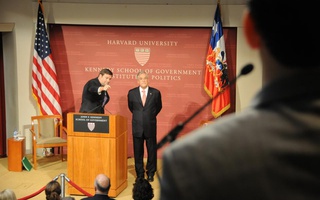{shortcode-1fedbfbf879cc1bdba1470faded4d9d15b710bd0}
The David Rockefeller Center for Latin American Studies cancelled its January program in Chile due to ongoing protests in the country, according to the center’s website.
Since 2003, the DRCLAS program has sent 15 college students during winter break to work alongside Chilean students from a local university, Universidad Mayor, in a rural, indigenous region outside of the capital Santiago. Those undergraduates volunteer in several fields, including medicine, education, and agriculture.
Chile has been roiled by demonstrations since October, when students began protesting a price raise in the subway system. The protests have evolved to focus on an expansive range of social issues, with protestors claiming a high cost of living, rampant inequality, and various infrastructure issues. In late October, approximately 1 million Chileans joined demonstrations in Santiago that have yet to cease.
Several students who participated in the program in past years said they are disappointed that others will not have the chance to go this year.
Annie Miall ’22, who attended the program in Jan. 2019, said she enjoyed the experience she had in Chile because it provided her a new outlook on medicine.
“I am really sad to hear that the program is cancelled because it was one of my favorite trips I have taken at Harvard,” Miall said. “And it really changed my perspective on what it means to be a physician.”
However, given the political unrest in Santiago, she said she sees the cancellation as a prudent decision.
“It is probably best, due to the political instability in Chile right now, for students not to partake just for this year,” Miall said. “But I think in future years, I really hope that it is not cancelled so that more people can get to enjoy and learn from that experience.”
The program's facilitators said they were similarly disappointed. Pilo Mella, the program manager for the Chile trip, noted that the current instability would complicate organizing the trip properly — one of the main reasons for its cancelation. She added that Universidad Mayor ultimately made the decision to cancel the trip.
“Their decision is not unreasonable given that the coordination required to organize the program takes several weeks,” Mella said. “I understand why they canceled the program but it’s unfortunate…the decision was based on the uncertainty we are still living in in Chile.”
Despite this year’s cancellation, Mella pointed out the learning opportunity that studying in Chile will present to students in the future. As of now, the decision to cancel the January trip only applies to this year's program.
“This is a great opportunity for future students to come, to study and understand the social protests, the demands of the people and the proposed changes to the constitution and public policies and also how human rights violations have been handled here in Chile,” she said.
Read more in News
SFFA Expert Witness Releases Working Paper Examining Harvard’s Recruitment of African American ApplicantsRecommended Articles
-
 At IOP, Chilean President Defends Response to Protests
At IOP, Chilean President Defends Response to Protests -
Chilean Activists Speak at HarvardTwo leaders of the Chilean Students Movement proposed economic, political, and social reforms to rectify pervasive inequity in the Chilean education system in a talk at the Harvard Graduate School of Education on Thursday afternoon.
-
Harvard Leaders Voice Support for Harvard-Chile RelationshipHarvard President Drew G. Faust, Massachusetts Governor Deval L. Patrick ’78, and Vice Chairman of the Banco de Chile Andrónico Luksic stressed the importance of collaboration between Harvard and Chile during the inaugural event Thursday morning for the Rethinking Chile at the Beginning of the 21st Century Seminar.
-
 Photo Essay: Santiago, Chile
Photo Essay: Santiago, Chile













